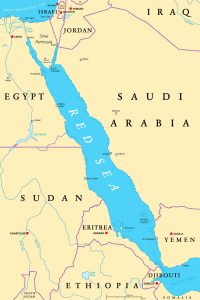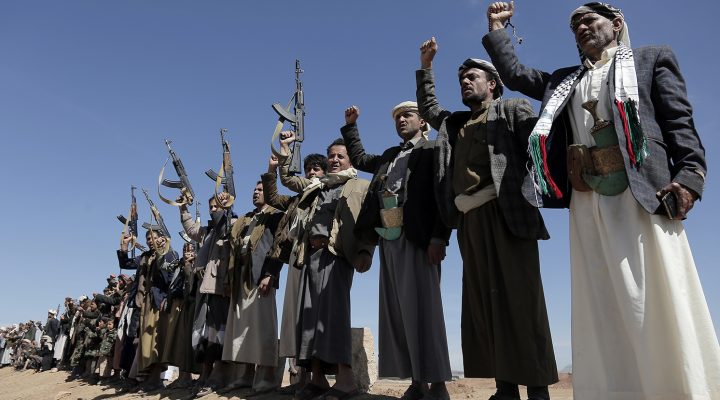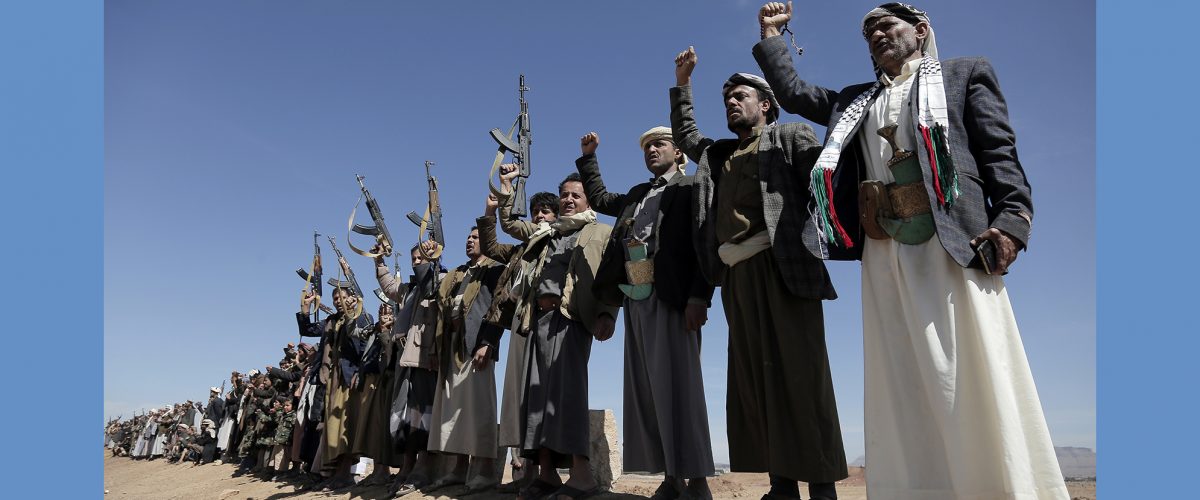In the last couple of weeks, one word or phrase that has been serially mentioned in the media is the Houthi, a Yemeni militant group. Most Americans — distracted by the war in Gaza — know little about this other terrorist group.
The group is mainly mentioned in relation to the Israel-Hamas war and their activities on the Red Sea where they are accused of attacking vessels. In response, the Houthis claimed commercial ships on the Red Sea are safe and said they only target Israel-linked ships, a country they oppose on moral grounds due to the war in Gaza.
But the group’s antecedents show they have a long history of being rebellious or warlike.

Yemen’s Houthi followers ride a vehicle carrying a billboard depicting Yemen’s Houthi movement leader Abdul Malek Badr al-Dain al-Houthi during a tribal rally and parade against the United States-led aerial attacks launched on sites in Yemen, and solidarity with Palestinians, on January 22, 2024, near Sana’a, Yemen. (Photo by Mohammed Hamoud/Getty Images)
Formed in the 1990s by Hussein Badreddin al-Houthi, a man who bears his tribe’s name and after whom the group is named, the Houthis, also known as Ansar Allah or supporters of God, are part of the Bakil confederation, one of the three major ethnic divides in the West Asian country of Yemen.
With a history dating back to the Ottoman empire, Yemen, a country of about 34 million people, is a relatively new state that was formed in 1990 after the northern and southern protectorates of the geographical areas merged. The country is considered one of the world’s poorest, with weak institutions. It was in the midst of the challenges besetting the country that the Houthi emerged as a formidable force to challenge the authority of the country’s former leadership (led by Ali Abdullah Saleh), accusing it of mismanagement and corruption.
In February 2012, with the Arab Spring sweeping across Middle East and North African countries, Saleh, under pressure from his people, resigned and handed over power to Abdrabbuh Mansur Hadi. The change in leadership didn’t placate the Houthis, as the rebels shifted their opposition to Hadi who, like his predecessor, enjoyed the backing of Saudi Arabia, a rich and powerful country resented by the Houthis. Opposition between both sides soon descended into a civil strife that endures to this day.
To date, the Houthis, who practice the Zaidi branch of Shia Islam, exercise control over much of the northern parts of the country, and the skirmishes in Yemen helped trigger what has been described by the United Nations as the largest humanitarian crisis in the world, with 80% of the population, about 24 million people, in need of humanitarian aid and protection.
The Houthis’ rise to prominence is similar to that of Boko Haram, a terrorist group in Nigeria that began as a sect preaching and opposing government laws, then openly defying laws and then dictating their demands, creating another of the world’s worst humanitarian crises in northern Nigeria.
Both the Houthis and Boko Haram thrive in spite of the elimination of their founding leaders by government forces — Hussein al-Houthi in 2004 and Muhammed Yusuf in 2009. And so, from being an opposition voice against governments accused of corruption and poor leadership in Yemen, the Houthis, with the backing of Iran, morphed into a rebellion that soon saw them fingered not only as a major threat to international trade on the Red Sea, but as a militant group accused of religious crimes by the U.S. Commission on International Religious Freedom and U.S. State Department.

(123rf.com)
The Red Sea borders Sudan, Egypt and Eritrea to the west; Yemen, Saudi Arabia and Djibouti to the east, Somalia and Israel to the south and Jordan to the north. It links the Suez Canal, a channel for Asia and Europe bound ships. It’s on this maritime pathway that vessels are supposed to pass to and from different continents, but the Houthis have posed a nightmare to crew members on the route.
On Jan. 11, the U.S., in collaboration with Britain, Bahrain, Australia, the Netherlands and Canada, attacked Houthi facilities in Yemen. A day after that, the U.S. followed up with another attack on the group’s radar site in Yemen.
Speaking after the Jan. 11 strike in Yemen, U.S. President Joe Biden said it was intended to serve as a warning to the Houthis that their actions no longer would be tolerated. He accused the Houthis of spearheading attacks “against international maritime vessels in the Red Sea — including the use of anti-ship ballistic missiles for the first time in history.”
The attacks, he said, “have endangered U.S. personnel, civilian mariners and our partners, jeopardized trade and threatened freedom of navigation.” He added that more than 50 nations were affected in 27 attacks on international commercial ships by the Houthis.
Burak Şakir Şeker, an expert on the Red Sea, said in an article published by the Conversation: “The Houthis are, currently, the Red Sea basin’s most pressing security danger. Houthi soldiers have hounded, assaulted and taken control of many boats since 2016. Their earliest techniques, such as rocket-propelled grenades, were not very sophisticated, but their strategies have evolved to be more hazardous and successful. They have employed mines, drones and anti-ship missiles.”
About 33,000 merchant ships pass through the waters every year and thus insecurity on the route impacts cost of transportation and commodities.
By its strategic importance, “the Red Sea is also a security hotspot, drawing in countries that sit on either side of it, such as Yemen and Eritrea, as well as countries much further afield, such as the U.S. and China,” Seker said.
Houthi opposition to Saudi Arabia also plays out on the Red Sea. The Houthis and Shia adherents fear the Saudi religious doctrine of Salafism or Wahhabism could erode their beliefs.
Not wearied by its war in Yemen, the Houthi leadership saw an opportunity to extend its regional influence in the Middle East by siding with Hamas in its current war with Israel. Apart from impeding ships it considers linked to Israel, several missiles have been fired by the rebels into Israel as a show of solidarity with Hamas. Some observers view the Houthi’s meddling in the Israel-Hamas conflict as simply a way of standing in the way of peace efforts which Saudi Arabia seems interested in championing between it and Israel and by extension ending the conflict in Gaza.
Houthi activities and threat to peace recently led to the group being classified by the U.S. State Department as an Entity of Particular Concern on the recommendation of the USCIRF. That places the Houthis in the bad company of Boko Haram, al-Shabaab, Hay’at Tahrir al-Sham, ISIS-Sahel, Islamic State in West Africa, the Taliban and Jamaat Nasr al-Islam wal Muslimin.
The threat posed by the Houthis adds to the worry of those who fear that the Israel-Hamas conflict could worsen and escalate beyond the region.
Anthony Akaeze is a Nigerian-born freelance journalist who lives in Houston. He covers Africa for BNG.


